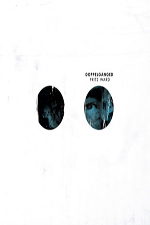Review | Doppelgänged, by Fritz Ward
Blue Hour Press, 2011
 |
Though the writing community generally acknowledges ebooks as an economic- and eco-friendly alternative, their reputation remains lukewarm. Many writers, even the most innovative, desire—understandably—to see the thing they’ve made become an actual thing: a book, an object, something in the hand, something to sign, to sell. If a chapbook risks ephemerality, then the echapbook seems predetermined to dematerialize, but perhaps the way to resist ephemerality lies in embracing the most intangible of media especially when the design of an ebook rivals, if not exceeds, the average chapbook.
“I rendered the past a senseless tense,” Fritz Ward writes in “Love Letter Where I Am Someone Else,” and perhaps the statement functions not only for the specific poem but also for the chapbook’s project. After all, he calls the book Doppelgänged—appropriate, since the digital form insinuates itself as print’s fraternal, some would say evil, twin who, in the end, we find out, is not so different from the sibling we know so well:
Here’s the first person, no strings
attached. Here’s the I in a jar
of formaldehyde above an unmade bed
and a narrator dressed in ellipses.
And so Ward gives us the familiar in an unfamiliar way: even his voice chimes with some distant memory of a voice, but we can’t quite place where we heard it or whose it is, and so we keep conjuring and reconjuring faces to try on the words. The doppelgänger, in his various versions and inversions, becomes a Buddhist trucker:
What’s imported
tomorrow is exportant,
like a satchel of fool’s gold
hidden between green bananas
and tulips in bondage.
It is pure inevitability,
like the insects turning inside out
against the windshield
and, later, John Wayne in drag:
In his one yellow dress, John Wayne
approximates the Mojave.
Swift to sear, but slow to blow
the candles out, his grit scours
the tongue in the sweat lodge of my mouth.
A reader may be wary of holding on to this Proteus throughout his incarnations, as a collection built upon this duplicitous mechanism so often exhausts its possibilities. But because of the chapbook’s brevity and the interstitial relief of miscellaneous poems, the reader may experience curiosity rather than annoyance with the method.
At the turn of the twentieth century, two men, William West and Will West, were incarcerated at the state penitentiary in Leavenworth, Kansas. Not only were their names nearly identical, they appeared indistinguishable, and their Bertillon measurements, then the standard identification system, matched perfectly. Both denied having a twin and yet, they appeared to be identical. Only their fingerprints distinguished them.
Perhaps the same holds true for Ward and his doppelgänger: Though “the villains / are poorly lit,” the fingerprints smudged all over the poems suggest that Ward perpetrates the stolen identities—“I’m just his stand-in”—not to fracture the self but to gather the fragments of the self into a whole. “Come,” Ward writes:
let’s bind ourselves
together—like a book
our parents dream
of burning. ![]()
Fritz Ward is the author of one chapbook, Doppelgänged (Blue Hour Press, 2011). He received his MFA in poetry from the University of North Carolina–Greensboro.